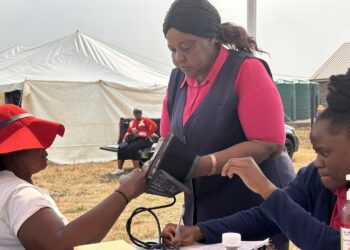DELMAS – As winter approaches in Delmas and surrounding areas of Mpumalanga, child maintenance recipients face delays due to a temporary suspension of the electronic payment system. The Department of Justice and Constitutional Development announced the pause on Thursday, May 23, 2024, after detecting suspicious activity attempting to compromise the system’s security.
Yvonne Mokaela, a resident of Botleng Extension 6 who relies on child maintenance payments, expressed her frustration. “How can a department like Justice be hacked? It shows someone isn’t doing their job. Now I’m worried. That money is vital for my child’s care. They should’ve at least given a timeframe for the system’s restoration,” Mokaela stated.
Sifiso Manamela, a Delmas-based computer programmer, highlighted the rise in cybercrime. “Smaller towns often see attacks on ATMs and local businesses. But even major cities and national governments are increasingly targeted. These breaches will likely continue, disrupting services. Everyone, including the government, needs to be vigilant against cyber threats,” Manamela explained.
The Department of Justice and Constitutional Development confirmed an investigation is underway to assess potential breaches and strengthen security protocols. To ensure uninterrupted payments, beneficiaries can visit their nearest court with original identification documents for temporary manual disbursements.
“We are committed to fortifying our systems to guarantee the safety and integrity of our electronic payment services,” said Kgalalelo Masibi, the Department of Justice and Constitutional Development spokesperson. “The security of beneficiary information and payment system reliability are our top priorities.”
The Department of Justice and Constitutional Development apologised for the inconvenience and thanked the public for their patience as they addressed the situation. Beneficiaries and interested parties are advised to monitor official department channels for updates.
This incident highlights South Africa’s growing vulnerability to cybercrime. According to INTERPOL’s African Cyberthreat Assessment Report 2022, a staggering 230 million cyber threats were detected in the country, with a concerning 95.21% being email-based attacks. Furthermore, the report indicates a 100% increase in mobile banking application fraud and an alarming average of 577 malware attacks every hour.
Experts point to weaknesses in cybercrime legislation and law enforcement training as contributing factors. While South Africa’s Cyber Crime Bill was adopted in 2021, proper training for cyber police remains inadequate.
“South Africa is a recognised target for cybercrime, ranking among the highest attack regions globally. Lack of investment in cybersecurity makes us an attractive target for criminals,” said Rob Griggs, Regional Managing Director of SecurityHQ, SA, and John Taylor, Regional Sales Director of SecurityHQ, SA. They further highlight the global challenge of limited technical resources for cybercrime support and analysis.























